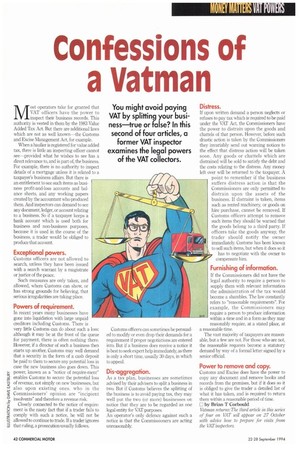Confessions of a Vatman
Page 44

If you've noticed an error in this article please click here to report it so we can fix it.
You might avoid paying VAT by splitting your business—true or false? in this second of four articles, a former VAT inspector examines the legal powers of the VAT collectors. Most operators take for granted that VAT officers have the power to inspect their business records. This authority is vested in them by the 1983 Value Added Tax Act. But there are additional laws which are not as well known—the Customs and Excise Management Act, for example.
When a haulier is registered for value added tax, there is little an inspecting officer cannot see—provided what he wishes to see has a direct relevance to, and is part of, the business. For example, there is no authority to inspect details of a mortgage unless it is related to a taxpayer's business affairs. But there is an entitlement to see such items as business profit-and-loss accounts and balance sheets, and any working papers created by the accountant who produced them. And inspectors can demand to see any document, ledger, or account relating to a business. So if a taxpayer keeps a bank account which is used both for business and non-business purposes, because it is used in the course of the business, a trader would be obliged to produce that account
Exceptional powers.
Customs officers are not allowed to search, unless they have been issued with a search warrant by a magistrate or justice of the peace.
Such measures are only taken, and allowed, where Customs can show, or has strong grounds for believing, that serious irregularities are taking place.
Powers of requirement.
In recent years many businesses have gone into liquidation with large unpaid creditors including Customs. There is very little Customs can do about such a loss: although it may be at the front of the queue for payment, there is often nothing there. However, if a director of such a business then starts up another. Customs may well demand that a security in the form of a cash deposit be paid to them to secure any potential loss in case the new business also goes down. This power, known as a "notice of require-ment" enables Customs to secure the potential loss of revenue, not simply on new businesses, but also upon existing ones, who in the Commissioners' opinion are "incipient insolvents" and therefore a revenue risk.
Closely connected to the notice of requirement is the nasty fact that if a trader fails to comply with such a notice, he will not be allowed to continue to trade. If a trader ignores that ruling, a prosecution usually follows. Customs officers can sometimes be persuaded to modify or even drop their demands for a requirement if proper negotiations are entered into. But if a business does receive a notice it is best to seek expert help immediately; as there is only a short time, usually 30 days, in which to appeal.
Dis-aggregation.
As a tax plan, businesses are sometimes advised by their advisers to split a business in two. But if Customs believes the splitting of the business is to avoid paying tax, they may well put the two (or more) businesses on notice that they are to be regarded as one legal entity for VAT purposes, An operator's only defence against such a notice is that the Commissioners are acting unreasonably'.
Distress.
If upon written demand a person neglects or refuses to pay tax which is required to be paid under the VAT Act, the Commissioners have the power to distrain upon the goods and chattels of that person. However, before such drastic action is taken by the Commissioners they invariably send out warning notices to the effect that distress action will be taken soon, Any goods or chattels which are distrained will be sold to satisfy the debt and the costs relating to the distress. Any money left over will be returned to the taxpayer. A point to remember if the business suffers distress action is that the Commissioners are only permitted to distrain upon the assets of the business. If distraint is taken, items such as rented machinery or goods on hire purchase, cannot be removed. If Customs officers attempt to remove such items they should be warned that the goods belong to a third party. If officers take the goods anyway, the trader should notify the owner immediately. Customs has been known to sell such items, but when it does so it has to negotiate with the owner to compensate him.
Furnishing of information.
If the Commissioners did not have the legal authority to require a person to supply them with relevant information the administration of the tax would become a shambles. The law constantly refers to "reasonable requirements". For example, the Commissioners may require a person to produce information within a time and in a form as they may reasonably require, at a stated place, at a reasonable time.
The vast majority of taxpayers are reasonable, but a few are not. For those who are not, the reasonable requests become a statutory demand by way of a formal letter signed by a senior official.
Power to remove and copy.
Customs and Excise does have the power to copy any document and remove books and records from the premises, but if it does so it is obliged to give the trader a detailed list of what it has taken, and is required to return them within a reasonable period of time.
CI by Brian T Corbould Vatman returns:The third article in this series of four on VAT will appear on 27 October with adtice how to prepare for visits from the VAT inspector&
























































































